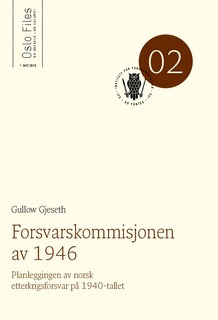Forsvarskommisjonen av 1946: planleggingen av norsk etterkrigsforsvar på 1940-tallet
Research report
Permanent lenke
http://hdl.handle.net/11250/2415529Utgivelsesdato
2016Metadata
Vis full innførselSamlinger
Sammendrag
The recommendations of the Defence Commission of 1946 have been portrayed in defence literature as having had little relevance to the establishment of Norway’s post-war defence posture. Gullow Gjeseth argues against this view and insists that the commission’s proposals for the defence of Norway were of great value, particularly at the conceptual level. The commission’s premise was that Norway needed allies in case of an attack. Accordingly, the commission recommended a concept for a peripheral defence strategy. The aim was to secure key areas, primarily along the coast, as bases for receiving help. For the concept to work, Norwegian forces would have to hold areas until help could arrive. Holding time – the estimated length of time the Norwegian armed forces were to maintain control of a defined area – was a guiding element in Norwegian defence planning throughout the Cold War. There is every reason to suppose the commission made valuable contributions to the discussion of Norway’s alliance membership in 1949. It is true that the commission failed to foresee the results of the tenser international climate that would emerge in the 1950s and the abundant resources that would become available to Norway with NATO membership. Nor did the commission give consideration to standing units in peacetime or prioritisation of North Norway. However, the commission correctly perceived an urgent need for preparedness, and elements of its proposals can be discerned in Norway’s post-war defence.
